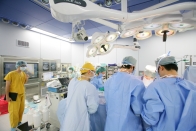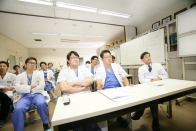| Gastroenterological Surgery 1 |
| Director NAGINO, Masato (Professor) 7W · 13E |
| Experienced staff do their utmost to treat diseases, mainly tumors |
| Digestive Surgery 1 provides medical care mainly for tumors in the gastrointestinal tract including stomach, duodenum, small intestine, and large intestine and liver, biliary tract (gallbladder and bile duct), and pancreas. |


Medical Care System
A total of 28 surgeons with eight years or more of experience provide medical care. In the outpatient clinic, 10 surgeons with special expertise provide medical care three times a week (Monday, Wednesday, and Friday). In the inpatient department, at least two surgeons mainly provide medical care for each patient, but the treatment strategy and clinical course are always discussed with all members in our department.
Target Disease
We perform preoperative diagnosis, surgical therapy, perioperative management, postoperative chemotherapy, and therapy for recurrent cancer. We treat diseases such as hepatobiliary and pancreatic malignant tumor, chronic pancreatitis, benign biliary tract disease (such as gallstones), esophageal tumor, stomach tumor, large intestine / colorectal tumor, and pelvic tumor.
Strong Fields
We are confident in performing difficult surgery such as hepatopancreatoduodenectomy, hepatectomy with combined vascular resection for far-advanced biliary cancer and pelvic exenteration, and thoracolaparotomic esophagectomy. Especially, our department has the best treatment results for hilar cholangiocarcinoma regardless of whether in or outside of Japan. Recently we have also actively conducted non-invasive surgeries, such as laparoscopic liver resection, laparoscopic pancreatic resection, and single incision laparoscopic cholecystectomy, as well as robot-assisted surgeries for colorectal cancer using the da Vinci Surgical System.
Clinical Results
The total number of surgeries in 2011 was 671. Of those, hepatectomy for biliary cancer: 68; other hepatectomies: 37 (of those, 17 are laparoscopic surgery); laparoscopic cholecystectomy: 25 (of those, 14 are single incision type); pancreaticoduodenectomy: 26; distal pancreatectomy: 12 (of those, 4 are laparoscopic surgery); surgery for esophageal cancer: 30; other esophageal surgery: 5; gastric cancer: 48 (of those, 9 are laparoscopic surgery); surgery for colon cancer: 68 (of those, 32 are laparoscopic surgery); surgery for rectal cancer: 69 (of those, 22 are laparoscopic surgery, 4 are robot-assisted surgery, and 14 are pelvic exenteration). The number of resections for hilar cholangiocarcinoma is the largest in Japan.
Advanced Medicine and Research
Robot-assisted surgery for colorectal cancer using the da Vinci Surgical System. A phase III comparative study in patients with resected cholangiocarcinoma is conducted comparing the group receiving postoperative adjuvant chemotherapy with gemcitabine and the surgery alone group; a phase II clinical study of postoperative adjuvant chemotherapy with TS-1 in patients who underwent resection for liver metastasis resulting from colorectal cancer.
Website of the Department
http://www.med.nagoya-u.ac.jp/tumor/










